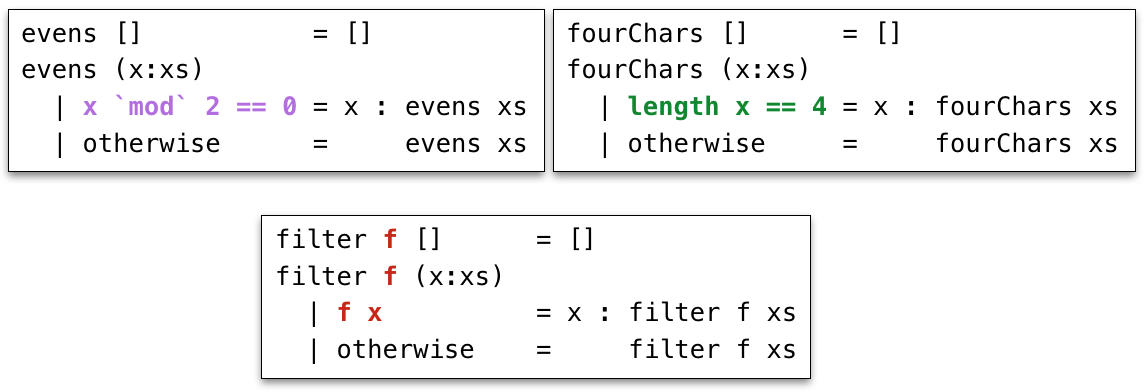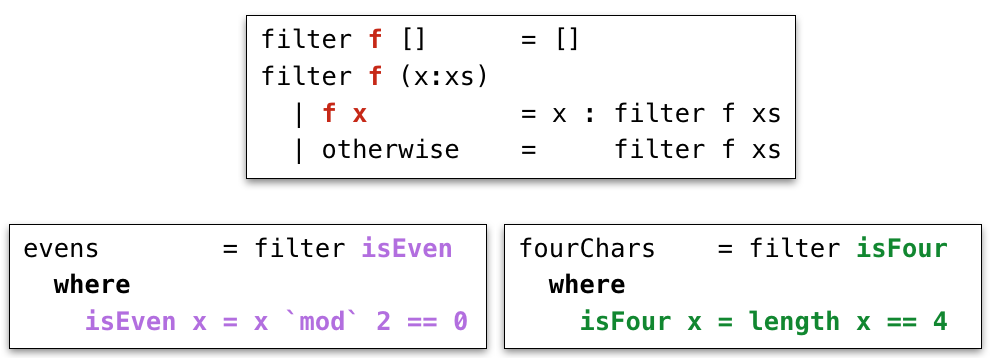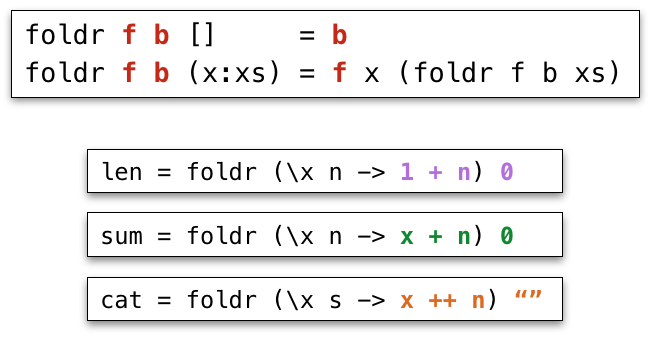Plan for this week
Last week:
user-defined data types
manipulating data-types with pattern matching and recursion
how to make recursive functions more efficient with tail recursion
The long arc of history
Pattern matching is a very old PL idea …
- Variants of LISP from 1970 by Fred McBride
… but now finally added to Python 3.10 in 2020 nearly 50 years later
- https://www.python.org/dev/peps/pep-0622/
def make_point_3d(pt):
match pt:
case (x, y):
return Point3d(x, y, 0)
case (x, y, z):
return Point3d(x, y, z)
case Point2d(x, y):
return Point3d(x, y, 0)
case Point3d(_, _, _):
return pt
case _:
raise TypeError("not a point we support")
Plan for this week
Last week:
user-defined data types
manipulating data-types with pattern matching and recursion
how to make recursive functions more efficient with tail recursion
This week:
code reuse with higher-order functions (HOFs)
some useful HOFs:
map,filter, andfold
Recursion is good…
Recursive code mirrors recursive data
- Base constructor -> Base case
- Inductive constructor -> Inductive case (with recursive call)
But it can get kinda repetitive!
Example: evens
Let’s write a function evens:
-- evens [] ==> []
-- evens [1,2,3,4] ==> [2,4]evens :: [Int] -> [Int]
evens [] = ...
evens (x:xs) = ...
Example: four-letter words
Let’s write a function fourChars:
-- fourChars [] ==> []
-- fourChars ["i","must","do","work"] ==> ["must","work"]fourChars :: [String] -> [String]
fourChars [] = ...
fourChars (x:xs) = ...
Yikes! Most Code is the Same!
Lets rename the functions to foo:
foo [] = []
foo (x:xs)
| x mod 2 == 0 = x : foo xs
| otherwise = foo xs
foo [] = []
foo (x:xs)
| length x == 4 = x : foo xs
| otherwise = foo xsOnly difference is condition
x mod 2 == 0vslength x == 4
Moral of the day
D.R.Y. Don’t Repeat Yourself!
Can we
reuse the general pattern and
plug-in the custom condition?
Higher-Order Functions
General Pattern
- expressed as a higher-order function
- takes plugin operations as arguments
Specific Operation
- passed in as an argument to the HOF
The “filter” pattern

General Pattern
- HOF
filter - Recursively traverse list and pick out elements that satisfy a predicate
Specific Operations
- Predicates
isEvenandisFour

Avoid duplicating code!
QUIZ: What is the type of filter?
-- evens [1,2,3,4] ==> [2,4]
evens :: [Int] -> [Int]
evens xs = filter isEven xs
where
isEven :: Int -> Bool
isEven x = x `mod` 2 == 0
-- fourChars ["i","must","do","work"] ==> ["must","work"]
fourChars :: [String] -> [String]
fourChars xs = filter isFour xs
where
isFour :: String -> Bool
isFour x = length x == 4So what’s the type of filter?
{- A -} filter :: (Int -> Bool) -> [Int] -> [Int]
{- B -} filter :: (String -> Bool) -> [String] -> [String]
{- C -} filter :: (a -> Bool) -> [a] -> [a]
{- D -} filter :: (a -> Bool) -> [a] -> [Bool]
{- E -} filter :: (a -> b) -> [a] -> [b]
Type of filter
-- evens [1,2,3,4] ==> [2,4]
evens :: [Int] -> [Int]
evens xs = filter isEven xs
where
isEven :: Int -> Bool
isEven x = x `mod` 2 == 0
-- fourChars ["i","must","do","work"] ==> ["must","work"]
fourChars :: [String] -> [String]
fourChars xs = filter isFour xs
where
isFour :: String -> Bool
isFour x = length x == 4For any type a
- Input a predicate
a -> Booland collection[a] - Output a (smaller) collection
[a]
filter :: (a -> Bool) -> [a] -> [a]filter does not care what the list elements are
- as long as the predicate can handle them
filter is polymorphic (generic) in the type of list elements
Example: ALL CAPS!
Lets write a function shout:
-- shout [] ==> []
-- shout ['h','e','l','l','o'] ==> ['H','E','L','L','O'] shout :: [Char] -> [Char]
shout [] = ...
shout (x:xs) = ...
Example: squares
Lets write a function squares:
-- squares [] ==> []
-- squares [1,2,3,4] ==> [1,4,9,16] squares :: [Int] -> [Int]
squares [] = ...
squares (x:xs) = ...
Yikes, Most Code is the Same
Lets rename the functions to foo:
-- shout
foo [] = []
foo (x:xs) = toUpper x : foo xs
-- squares
foo [] = []
foo (x:xs) = (x * x) : foo xs
Lets refactor into the common pattern
pattern = ...
The “map” pattern

General Pattern
- HOF
map - Apply a transformation
fto each element of a list
Specific Operations
- Transformations
toUpperand\x -> x * x
map f [] = []
map f (x:xs) = f x : map f xsLets refactor shout and squares
shout = map ...
squares = map ...

QUIZ
What is the type of map?
map f [] = []
map f (x:xs) = f x : map f xs(A) (Char -> Char) -> [Char] -> [Char]
(B) (Int -> Int) -> [Int] -> [Int]
(C) (a -> a) -> [a] -> [a]
(D) (a -> b) -> [a] -> [b]
(E) (a -> b) -> [c] -> [d]
-- For any types `a` and `b`
-- if you give me a transformation from `a` to `b`
-- and a list of `a`s,
-- I'll give you back a list of `b`s
map :: (a -> b) -> [a] -> [b]Type says it all!
The only meaningful thing a function of this type can do is apply its first argument to elements of the list
Hoogle it!
Things to try at home:
can you write a function
map' :: (a -> b) -> [a] -> [b]whose behavior is different frommap?can you write a function
map' :: (a -> b) -> [a] -> [b]such thatmap' f xsreturns a list whose elements are not inmap f xs?
QUIZ
What is the value of quiz?
map :: (a -> b) -> [a] -> [b]
quiz = map (\(x, y) -> x + y) [1, 2, 3](A) [2, 4, 6]
(B) [3, 5]
(C) Syntax Error
(D) Type Error
(E) None of the above
Don’t Repeat Yourself
Benefits of factoring code with HOFs:
Reuse iteration pattern
think in terms of standard patterns
less to write
easier to communicate
Avoid bugs due to repetition
Recall: length of a list
-- len [] ==> 0
-- len ["carne","asada"] ==> 2
len :: [a] -> Int
len [] = 0
len (x:xs) = 1 + len xs
Recall: summing a list
-- sum [] ==> 0
-- sum [1,2,3] ==> 6
sum :: [Int] -> Int
sum [] = 0
sum (x:xs) = x + sum xs
Example: string concatenation
Let’s write a function cat:
-- cat [] ==> ""
-- cat ["carne","asada","torta"] ==> "carneasadatorta"
cat :: [String] -> String
cat [] = ...
cat (x:xs) = ...
Can you spot the pattern?
-- len
foo [] = 0
foo (x:xs) = 1 + foo xs
-- sum
foo [] = 0
foo (x:xs) = x + foo xs
-- cat
foo [] = ""
foo (x:xs) = x ++ foo xspattern = ...
The “fold-right” pattern

General Pattern
- Recurse on tail
- Combine result with the head using some binary operation
foldr f b [] = b
foldr f b (x:xs) = f x (foldr f b xs)
Let’s refactor sum, len and cat:
sum = foldr ... ...
cat = foldr ... ...
len = foldr ... ...Factor the recursion out!

You can write it more clearly as
sum = foldr (+) 0
cat = foldr (++) ""
The “fold-right” pattern
foldr f b [a1, a2, a3, a4]
==> f a1 (foldr f b [a2, a3, a4])
==> f a1 (f a2 (foldr f b [a3, a4]))
==> f a1 (f a2 (f a3 (foldr f b [a4])))
==> f a1 (f a2 (f a3 (f a4 (foldr f b []))))
==> f a1 (f a2 (f a3 (f a4 b)))Accumulate the values from the right
For example:
foldr (+) 0 [1, 2, 3, 4]
==> 1 + (foldr (+) 0 [2, 3, 4])
==> 1 + (2 + (foldr (+) 0 [3, 4]))
==> 1 + (2 + (3 + (foldr (+) 0 [4])))
==> 1 + (2 + (3 + (4 + (foldr (+) 0 []))))
==> 1 + (2 + (3 + (4 + 0)))
QUIZ
What does this evaluate to?
foldr f b [] = b
foldr f b (x:xs) = f x (foldr f b xs)
quiz = foldr (\x v -> x : v) [] [1,2,3](A) Type error
(B) [1,2,3]
(C) [3,2,1]
(D) [[3],[2],[1]]
(E) [[1],[2],[3]]
foldr (:) [] [1,2,3]
==> (:) 1 (foldr (:) [] [2, 3])
==> (:) 1 ((:) 2 (foldr (:) [] [3]))
==> (:) 1 ((:) 2 ((:) 3 (foldr (:) [] [])))
==> (:) 1 ((:) 2 ((:) 3 []))
== 1 : (2 : (3 : []))
== [1,2,3]
QUIZ
What is the most general type of foldr?
foldr :: (a -> b -> b) -> b -> [a] -> b
foldr f b [] = b
foldr f b (x:xs) = f x (foldr f b xs)(A) (a -> a -> a) -> a -> [a] -> a
(B) (a -> a -> b) -> a -> [a] -> b
(C) (a -> b -> a) -> b -> [a] -> b
(D) (a -> b -> b) -> b -> [a] -> b
(E) (b -> a -> b) -> b -> [a] -> b
Tail Recursive Fold
foldr f b [] = b
foldr f b (x:xs) = f x (foldr f b xs)Is foldr tail recursive?
What about tail-recursive versions?
Let’s write tail-recursive sum!
sumTR :: [Int] -> Int
sumTR = ...
Lets run sumTR to see how it works
sumTR [1,2,3]
==> helper 0 [1,2,3]
==> helper 1 [2,3] -- 0 + 1 ==> 1
==> helper 3 [3] -- 1 + 2 ==> 3
==> helper 6 [] -- 3 + 3 ==> 6
==> 6Note: helper directly returns the result of recursive call!
Let’s write tail-recursive cat!
catTR :: [String] -> String
catTR = ...
Lets run catTR to see how it works
catTR ["carne", "asada", "torta"]
==> helper "" ["carne", "asada", "torta"]
==> helper "carne" ["asada", "torta"]
==> helper "carneasada" ["torta"]
==> helper "carneasadatorta" []
==> "carneasadatorta"Note: helper directly returns the result of recursive call!
Can you spot the pattern?
-- sumTR
foo xs = helper 0 xs
where
helper acc [] = acc
helper acc (x:xs) = helper (acc + x) xs
-- catTR
foo xs = helper "" xs
where
helper acc [] = acc
helper acc (x:xs) = helper (acc ++ x) xspattern = ...
The “fold-left” pattern

General Pattern
- Use a helper function with an extra accumulator argument
- To compute new accumulator, combine current accumulator with the head using some binary operation
foldl f b xs = helper b xs
where
helper acc [] = acc
helper acc (x:xs) = helper (f acc x) xs
Let’s refactor sumTR and catTR:
sumTR = foldl ... ...
catTR = foldl ... ...Factor the tail-recursion out!
QUIZ
What does this evaluate to?
foldl f b xs = helper b xs
where
helper acc [] = acc
helper acc (x:xs) = helper (f acc x) xs
quiz = foldl (\xs x -> x : xs) [] [1,2,3](A) Type error
(B) [1,2,3]
(C) [3,2,1]
(D) [[3],[2],[1]]
(E) [[1],[2],[3]]
foldl f b (x1: x2: x3 : [])
==> helper b (x1: x2: x3 : [])
==> helper (f x1 b) (x2: x3 : [])
==> helper (f x2 (f x1 b)) (x3 : [])
==> helper (f x3 (f x2 (f x1 b))) []
==> ( x3 : (x2 : (x1 : [])))
The “fold-left” pattern
foldl f b [x1, x2, x3, x4]
==> helper b [x1, x2, x3, x4]
==> helper (f b x1) [x2, x3, x4]
==> helper (f (f b x1) x2) [x3, x4]
==> helper (f (f (f b x1) x2) x3) [x4]
==> helper (f (f (f (f b x1) x2) x3) x4) []
==> (f (f (f (f b x1) x2) x3) x4)Accumulate the values from the left
For example:
foldl (+) 0 [1, 2, 3, 4]
==> helper 0 [1, 2, 3, 4]
==> helper (0 + 1) [2, 3, 4]
==> helper ((0 + 1) + 2) [3, 4]
==> helper (((0 + 1) + 2) + 3) [4]
==> helper ((((0 + 1) + 2) + 3) + 4) []
==> ((((0 + 1) + 2) + 3) + 4)
Left vs. Right
foldl f b [x1, x2, x3] ==> f (f (f b x1) x2) x3 -- Left
foldr f b [x1, x2, x3] ==> f x1 (f x2 (f x3 b)) -- RightFor example:
foldl (+) 0 [1, 2, 3] ==> ((0 + 1) + 2) + 3 -- Left
foldr (+) 0 [1, 2, 3] ==> 1 + (2 + (3 + 0)) -- RightDifferent types!
foldl :: (b -> a -> b) -> b -> [a] -> b -- Left
foldr :: (a -> b -> b) -> b -> [a] -> b -- Right
Higher Order Functions
Iteration patterns over collections:
- Filter values in a collection given a predicate
- Map (iterate) a given transformation over a collection
- Fold (reduce) a collection into a value, given a binary operation to combine results
HOFs can be put into libraries to enable modularity
Data structure library implements
map,filter,foldfor its collectionsgeneric efficient implementation
generic optimizations:
map f (map g xs) --> map (f.g) xs
Data structure clients use HOFs with specific operations
- no need to know the implementation of the collection
Crucial foundation of
“big data” revolution e.g. MapReduce, Spark, TensorFlow
“web programming” revolution e.g. Jquery, Angular, React
